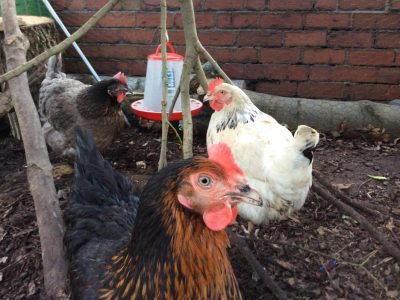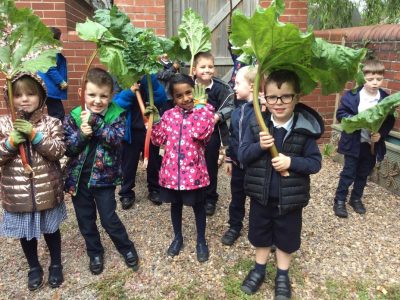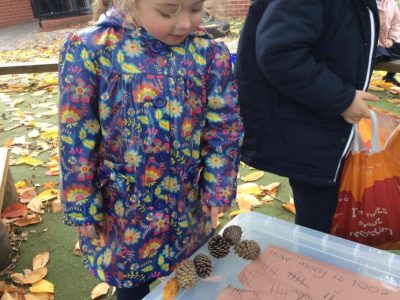We are fortunate to have a fantastic outdoor learning environment in our school which we work hard to develop for the children to use. It includes a wild life area, den building, woodland area, large school field, camp fire, willow dome, allotment with polytunnel, a bog garden and mini pond. We are so passionate about the children using the outdoors that we paid for a member of our own staff to be trained as a level 3 Forest School leader. She works across the school to deliver outdoor learning session with elements of forest school. Children love these opportunities and it ensures that we have a vibrant and engaging curriculum which is relevant to our pupils.
Policies for Outdoor Lessons
Outdoor Learning Blog
The Stanely Planet Savers Eco Club have had another busy and productive year.
October
We were delighted to receive an invitation from Jenny Foskett, from the Mid Yorkshire’s Sustainability Team, to help them plant tree seeds to kick start their tree nursery. Jenny guided us on a tree walk up through the local golf course to Pinderfields hospital. Once there we planted lots of acorns, conkers and ‘tree seed helicopters’ in old plastic milk bottles. We had a fabulous day with minimal complaining about the significant distance walked!
November and December saw the SPS Team busy with our annual Reverse Advent Calendar. They gave a very informative assembly about Advent, food banks and why it is important to think of other people as well as ourselves at this time of the year. As ever, our school community were very generous and we had a car full of food to take to the Wakefield Baptist Church for them to use at their Night Shelter and drop-in sessions.
December
We had been speaking about endangered animals and the children were very keen to raise some money for the WWF so we could adopt an animal for the year. They decided to run a stall selling plants, pinecone owls, and tasty treats at our school Christmas Fayre, and raised £60! The children introduced our adopted elephant to the rest of the school during their January assembly.
January / February
We always enjoy the R.S.P.B Big Schools Bird Watch. The Eco Club were very excited to introduce an Eco Challenge linked to this event this year and to share it with the other children. The prizes were hand knitted birds. They also created another fabulous power point to go with the prize presentation assembly.
SPS RSPB Eco Challenge winners.pptx
March / April
We were learning about Fair Trade in our Eco sessions and the Eco Team were very keen to create an event so we could present fairly traded chocolate around Easter time. They came up with the idea of a 5 R’s (Reduce Reuse, Recycle, Repair, Repurpose) Hat Parade.
The assembly SPS Fair Trade and Easter Eco Challenge Assembly.pptx generated much excitement! The whole school thoroughly enjoyed the parade – the hats on display were truly inspired, and there was even an extra prize for the person who strutted their stuff the best on the catwalk!
May / June
Our school Eco Code is recited at the beginning of every Eco Club assembly. It was written a few years ago by one of the SPS. As well as the 5 R’s Reduce Reuse, Recycle, Repair, Repurpose, it reminds us to never waste anything. To try and live out our code, we have had a Toy Swap in the past and the team were very keen to repeat this. Their assembly SPS Toy Swap assembly May 2025.pptx explained about the environmental impact of toys and how we can help reduce the harmful effects.
The Toy Swap itself was very much enjoyed, the children put in so much effort to make it such a success and even created their own cheerleading song and dance to drum up interest!
What a wonderful group of young people.



